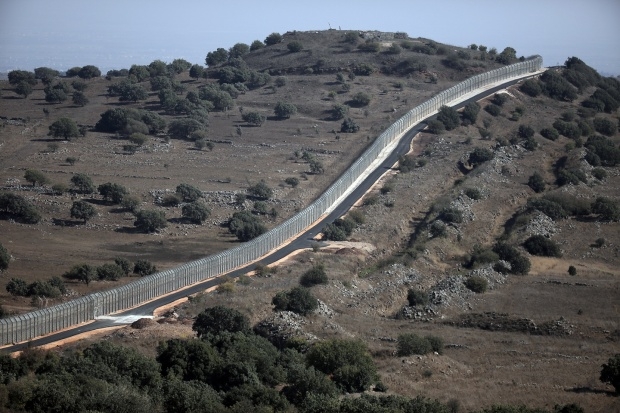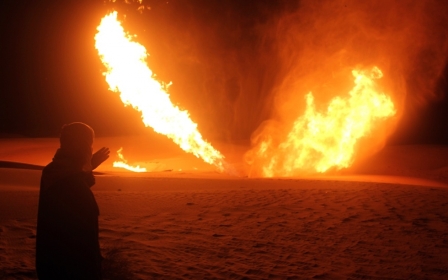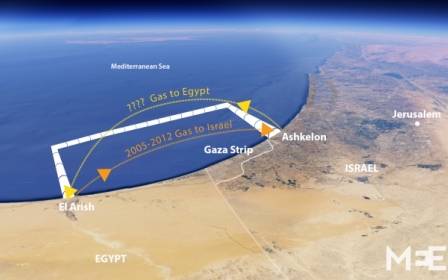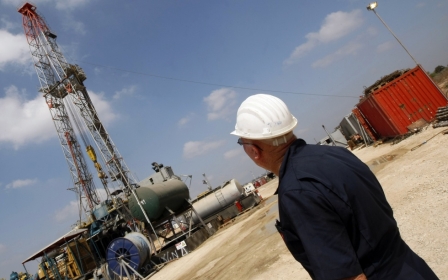How Islamist rebels engineered Israel’s oil grab in Syria

A US oil company is preparing to drill for oil in the Golan Heights.
Granted the license in February 2013 by Israel, Afek Oil and Gas is a subsidiary of Genie Energy Ltd, whose equity-holding board members include former US Vice President Dick Cheney, controversial media mogul Rupert Murdoch and financier Lord Jacob Rothschild. Also on the board is Brigadier General Effie Eitam, a former Israeli minister for infrastructure who currently resides in the Golan Heights himself.
Afek, which has exclusive rights to a 153-square-mile radius in the south of the Golan Heights, started “dirt works” in December 2014, to prepare the first site for drilling.
Israel captured the Golan Heights in the 1967 Six-Day War, annexing and occupying the territory in 1981 in violation of international law. As the conflict in Syria has escalated, the spillover into the Golan has invited Israel to label its de facto control over the territory as another security issue requiring military “defence.”
Accordingly, Israel has considered unilaterally creating a new buffer zone that would extend up to 10 miles inside Syrian territory on the pretext of securing the border from Islamist fighters.
Israel and the Islamists
The role of a prominent US energy company in the Golan Heights demonstrates that the Netanyahu administration has Obama’s unwavering backing in its effort to expand Israel’s energy footprint into Syria.
Yet there is considerable evidence that the burgeoning threat from Islamist militants in the Golan Heights is a direct consequence of Israel’s covert sponsorship of anti-Assad rebels in the region.
Last year, reports submitted by UN observers in the Golan Heights to the UN Security Council revealed a disturbing pattern of “cooperation between Israel and Syrian opposition figures” over a period of 18 months. The extensive reports confirmed that the Israeli army was assisting wounded Syrian rebels, and providing military assistance, from around March 2013 to summer 2014.
“Observers remarked in the report distributed on June 10 [2013] that they identified Israeli soldiers on the Israeli side handing over two boxes to armed Syrian opposition members on the Syrian side,” reported Ha’aretz.
Anti-Assad rebels receiving treatment and aid from the Israeli army included members of extremist al-Qaeda faction, al-Nusra Front, as well as the Islamic State (IS), according to a statement issued by Israeli Druze activists.
Yet during this period, the Syrian side of the Golan Heights was increasingly dominated by Islamist militants affiliated to al-Qaeda and IS.
The UN observer reports also revealed that the Israeli army was allowing Syrian rebels inside Israel. Last December, on his widely-read blog Tikun Olam, Israeli national security journalist Richard Silverstein cited Hebrew news reports showing that the Israeli army had established “a Camp Ashraf-style Syrian rebel encampment just inside Israeli territory on the border”. Israel’s plan, Silverstein surmised, is to “escalate its intervention by permitting rebels to operate openly inside Israel and engaging in cross-border sabotage-terror operations”. By creating “maximum instability inside Syria,” Israel hopes to weaken not just Assad, but also Iran and Hezbollah.
Silverstein’s reports of Israeli military assistance to anti-Assad rebels have been corroborated elsewhere. In August 2013, the French daily Le Figaro reported that an influx of 300 “hand-picked” Free Syrian Army (FSA) rebels trained and directed by CIA and Israeli commandos was en route from the Jordanian border to the Syrian capital, Damascus. The joint US-Israeli military training in anti-tank and anti-aircraft weapons had been taking place since 2012 at secret US-run camps in Jordan and Turkey.
Land for war
In March last year, Ha'aretz reported that prominent Syrian rebel leaders were “willing to give up claims to the Golan Heights in return for cash and Israeli military aid against President Bashar Assad”. Kamal al-Labwani, a top rebel leader, said, “Why shouldn’t we be able to sell the Golan Heights because it is better than losing Syria and Golan at once.”
The deal appears to have been struck. By August 2014, the Times of Israel reported that a FSA commander had “collaborated with Israel in return for medical and military support.” He had entered Israel five times to meet Israeli army officers, during which time he was provided with an Israeli mobile phone, medical support and clothing, 30 Soviet rifles, 10 RPG launchers with 47 rockets, and 48,000 5.56 millimeter bullets.
The following month, al-Labwani turned up in Israel on a 10-day tour. Despite giving lip-service to the cause of Syrian moderates, he criticised the war on IS: “Four thousand people have been killed by IS and 400,000 by the regime – who is the bigger terrorist? For me IS is only a small problem, but the Syrian government is a much bigger problem.” Although al-Labwani and others have been sidelined in the new covert assistance programme to the rebels, their thinking seems to reflect US-Israeli strategy.
In the same month, Israeli journalist Ehud Ya’ari, who once assisted Shlomo Gazit as coordinator of government activities in the Territories, reported the existence of an “undeclared truce” between Israel and al-Qaeda factions in Syria, whose “cadres prefer loose, ad hoc cooperation with other rebel factions, including those with ties to Israel.” Consequently, Ya’ari affirms that Israel will not attempt to “disrupt military strength” of al-Qaeda affiliates for now. “Some rebel groups maintain constant contact with the IDF, including frequent secret meetings reportedly held in Tiberias,” Ya’ari added, emphasizing that they are, however, the "moderate" variety. He admitted that Israel has supplied them “a modest amount of weapons,” including “rocket-propelled grenade launchers”.
What moderates?
Yet intelligence agencies have long been aware that the dividing line between the “moderate” and “extremist” rebels, and even between the various Islamist factions, is porous, if not fluid.
One rebel group, Harakat Hazm - the biggest recipient of US aid which received a significant shipment of anti-tank weapons from the US last spring and was among the “moderate” FSA groups to receive US-led training - a few months on had joined the Islamist militants, issuing a statement that US airstrikes were strengthening Assad.
Lieutenant Colonel Fares al-Bayyoush heads up the rebel Fursan al-Haq Brigade and reports directly to the Military Operations Command, led by the US, Britain and France, and which also involves Israel, operates out of Turkey and Jordan, and canvasses funding from Saudi Arabia and Qatar, among others. Al-Bayyoush told the New York Times last September that his men regularly “fought alongside the Nusra Front because they needed all the help they could get”. The rebel takeover of the northern town of Khan Sheikhoun was only achieved with the help of al-Qaeda suicide bombers. “We encourage them actually,” Bayyoush said. “And if they need vehicles, we provide them.”
This is deeply problematic. Firstly, many IS recruits are former FSA and Nusra Front rebels. It is frequently forgotten that the emergence of Jabhut al-Nusra was directly related to the movement of al-Qaeda fighters from Iraq into Syria. The Islamic State emerged from precisely the same nexus of people.
Secondly, Nusra fighters keep defecting to IS. Thirdly, in the wake of US-led airstrikes, Nusra and IS have held war planning meetings, coinciding with many Nusra units in northern Syria reconciling with IS.
Although a formal alliance appears unlikely, IS and Nusra fighters have previously teamed up to takeover Arsal, a town on the Lebanese-Syrian border. Such temporary alliances show that Islamist fighters are willing to join forces despite ideological differences to achieve tactical advantage against their common enemies. And despite ongoing ideological fractures, US-led airstrikes have increased pressure on al-Qaeda’s disparate leadership to support IS. In September 2014, al-Qaeda in the Arabian Peninsula (AQAP) issued a joint declaration of unity with al-Qaeda in the Islamic Maghreb (AQIM), calling for support of IS, and for unity between Islamist factions in Iraq and Syria.
Turkey’s terrorists are our terrorists
Turkey’s integral role in the US-led military command complex training supposed “moderate” rebels raises further questions. There is now a pile of mounting evidence in the public record, marshalled for instance by Columbia University’s Institute for the Study of Human Rights, that Turkey is covertly supporting IS, through military and logistical aid, training, medical care, financing, recruitment and even Turkish troops fighting alongside IS.
Despite this, Turkey continues to be courted as a key NATO ally in the war on IS, and the US is finalising an agreement with Turkey to train 15,000 Syrian rebels over three years. But this is not a new arrangement, as widely implied by most media reporting on the recent US-Turkish negotiations to use the Incirlik air base in Adana as a rebel training camp.
In reality, the “new” training programme to be led by the Turkish secret intelligence service (MIT) would be an extension of ongoing training programmes. In one training pipeline, rebels handpicked by the CIA travel to Turkey before being flown to Doha to receive training from Qatari special forces. We now know that the vetting process, both then and now, is deeply flawed. According to one former CIA operative familiar with the methods, “the vast majority of even check-the-box vetting is by third parties [who are] out-of-the-country players with skin in the game”.
It is difficult in this context to separate fact from spin. The much publicised US-Turkish tensions over IS policy, claiming that Turkey has played a largely backseat role in the anti-Assad (and now anti-IS) campaign, have masked the fact that Turkey has actually played the lead role, supervised by active on-the-ground involvement of CIA officials.
Indeed, Turkey’s involvement in training anti-Assad rebels under a US-led covert operation has gone on since 2012. FSA sources told BBC News the same year of a “special training programme based in Turkey at secret camps run by the Turkish military." The camps are part of a “secret nerve centre for military aid and communications for the Syrian rebels,” also involving Saudi and Qatar, set up in Adana.
“It’s the Turks who are military controlling it,” Gulf sources told Reuters about the military nerve centre. “Turkey is the main coordinator/facilitator.” Another BBC News report noted that the covert rebel training was taking place “in a US air base in southern Turkey.” Adana in southern Turkey is, of course, home to the Turkish/US air force installation Incirlik, used frequently by Washington for reconnaissance and military logistics operations. CIA and US special operations personnel are directly involved in coordinating and administering the training and selecting recipients.
Around the same time, in the summer of 2012, Israeli army military intelligence chief Major General Avi Kochavi warned that Islamist militants linked to al-Qaeda had moved into the buffer zone in the Golan Heights, “transforming it into a staging area for future attacks on Israel.” Yet as the Islamist presence in the zone magnified since then, so did tacit Israeli support for the same militants.
Two weeks ago, authenticated official documents of the Turkish military (the Gendarmerie General Command) were leaked online, showing that Turkey’s intelligence services (MIT) had been caught in Adana by military officers transporting missiles, mortars and anti-aircraft ammunition via truck “to the al-Qaeda terror organisation” in Syria.
FSA rebels are involved in the MIT-sponsored Turkish-Islamist support network, which is apparently supplying both al-Qaeda and IS. One ex-FSA fighter called Mahmoud “now runs safe houses in Turkey for foreign fighters looking to join Jabhat al-Nusra and Isil [Islamic State],” reports the Telegraph. Mahmoud is not even an "extremist". “Many of my friends are doing the same now,” he said. “Isil is the only solution for us… The most important thing now though is to remove the regime and Isil are the strongest group. I will do whatever it takes.”
The revelations, confirming Turkey’s longstanding role in sponsoring Islamist extremists in Syria, have done nothing to halt the Obama administration’s eagerness to put the Turkish MIT at the helm of the portended three-year rebel training scheme. Instead, US officials “are still debating with Turkey which groups will be picked” for training, “and have not yet finalised the questions to be asked in the vetting process.”
More war in Syria
Days before Israel was granted permission to drill for oil in the Golan Heights, the Israeli army began boosting and regrouping its occupying forces in the Syrian territory. The move had been prompted by three rebel factions, including the FSA’s Yarmouk Martyrs Brigade, switching allegiance to IS. Yet two years ago, the same Brigade was praising Israel for providing assistance to Syrian refugees and rebel fighters.
It has escaped everyone’s attention, though, that Israel’s decision to bolster its military occupation of the Golan Heights has followed a long period of covert assistance to militants in the territory, as part of an ongoing regional programme of clandestine support coordinated by the US, Britain and France. Both Turkey and Israel, lead players on the ground in this programme, have had an ambiguous relationship with the most militant elements of the rebel movement, with Turkey in particular providing comprehensive aid to IS fighters.
Despite that, Turkey is to continue its role in recruiting, training and supporting “moderate” rebels under the watchful eye of the CIA.
A US Army report recently highlighted the “potential for another armed conflict” between Israel and Syria “should substantial hydrocarbon resources be discovered” there. The paper by the Army’s Strategic Studies Institute observed that “US security and military support for its main allies in the case of an eruption of natural resource conflict in the East Mediterranean may prove essential in managing possible future conflict.” This could include “military training and equipment support” to defend Israel from attacks on its “energy infrastructure and gas developments”.
While pointing out that Israel’s estimated oil and gas reserves put it ahead of all Eastern Mediterranean countries, the US Army report also noted Syria’s significant offshore oil and gas potential. “Once the Syria conflict is resolved, prospects for Syrian offshore production - provided commercial resources are found - are high,” observed the report. Potential oil and gas resources can be developed “relatively smoothly once the political situation allows for any new exploration efforts in its offshore territories.”
Israeli military and intelligence sources now warn that the Yarmouk Martyr Brigade’s defection to IS increases the likelihood of an “Israeli intervention in Syria,” as IS now has “direct access to a long section of Israel’s Golan Heights border with Syria.” The defection also endangers anti-Assad rebel conquests across southern Syria, they conclude.
Given Israel’s ambitions to seal its conquest of the Golan Heights, coupled with longstanding western hopes to either topple Assad or force him to an accommodation, these observations raise probing questions. As Genie executive Effie Eitam said about the drilling plans two years ago, “Syria is not in a position to undermine our right to discover oil – if there is any.”
- Nafeez Ahmed PhD, is an investigative journalist, international security scholar and bestselling author who tracks what he calls the 'crisis of civilization.' He is a winner of the Project Censored Award for Outstanding Investigative Journalism for his Guardian reporting on the intersection of global ecological, energy and economic crises with regional geopolitics and conflicts. He has also written for The Independent, Sydney Morning Herald, The Age, The Scotsman, Foreign Policy, The Atlantic, Quartz, Prospect, New Statesman, Le Monde diplomatique, New Internationalist. His work on the root causes and covert operations linked to international terrorism officially contributed to the 9/11 Commission and the 7/7 Coroner’s Inquest.
The views expressed in this article belong to the author and do not necessarily reflect the editorial policy of Middle East Eye.
Photo: The Israeli-Syrian border in the Golan Heights (AFP)
New MEE newsletter: Jerusalem Dispatch
Sign up to get the latest insights and analysis on Israel-Palestine, alongside Turkey Unpacked and other MEE newsletters
Middle East Eye delivers independent and unrivalled coverage and analysis of the Middle East, North Africa and beyond. To learn more about republishing this content and the associated fees, please fill out this form. More about MEE can be found here.





